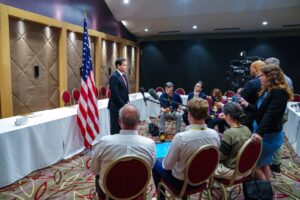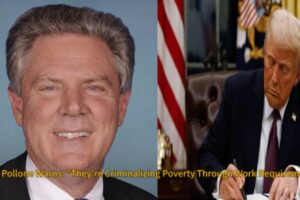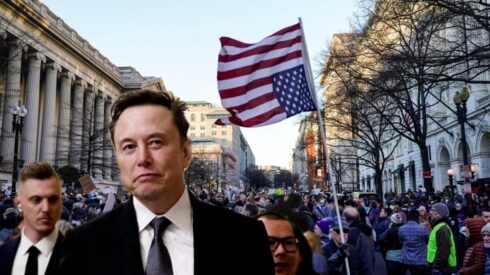Elon Musk, as head of the newly established Department of Government Efficiency (DOGE), has intensified his push for major reductions in federal agencies, advocating for what he describes as the elimination of bureaucratic inefficiencies. Speaking at the World Governments Summit in Dubai via video call, Musk reiterated his call to “delete entire agencies” to prevent wasteful spending and systemic inefficiencies from re-emerging.
Elon Musk, who has consolidated considerable influence within the Trump administration, emphasized that simply reducing funding or downsizing agencies would not suffice. “If we don’t remove the roots of the weed, then it’s easy for the weed to grow back,” he warned. His comments signal an unprecedented effort to reshape the structure of the federal government, with particular focus on eliminating agencies such as the U.S. Agency for International Development (USAID) and the Consumer Financial Protection Bureau (CFPB). These proposals align with President Donald Trump’s broader strategy of reducing federal expenditures and limiting government intervention in various sectors.
Political and Legal Challenges to DOGE’s Agenda
Elon Musk’s aggressive push to dismantle federal agencies has sparked fierce opposition from lawmakers, unions, and advocacy groups. Critics argue that the Department of Government Efficiency’s sweeping access to sensitive data and its ability to bypass traditional government oversight mechanisms pose significant risks. Multiple lawsuits have been filed by Democratic lawmakers and federal employee unions, challenging the legality of DOGE’s actions and questioning the constitutional authority of Musk in leading such efforts.
Privacy advocates have also raised concerns about DOGE’s methods, particularly regarding the department’s direct access to classified government databases. Some lawmakers have described Musk’s approach as a “hostile takeover of the federal government,” while others worry that rapid, large-scale cuts could weaken essential government functions, including consumer protections and international aid. Despite these challenges, Musk and his allies remain steadfast in their mission, dismissing concerns as political resistance to necessary reforms.
Elon Musk’s Vision: Reducing Bureaucracy and Government Intervention
In defending his proposals, Musk has consistently argued that the U.S. government has become bloated and inefficient. He contends that unnecessary bureaucratic layers hinder innovation, slow economic growth, and contribute to wasteful spending. “We really have here rule of the bureaucracy as opposed to rule of the people—democracy,” Musk stated, expressing his belief that government inefficiency stifles progress.
He has also voiced skepticism about the effectiveness of organizations like USAID and the National Endowment for Democracy, questioning their contributions to global stability and democracy promotion. “How much democracy have they achieved lately?” he asked, aligning with Trump’s broader vision of reducing U.S. involvement in international affairs. This perspective has drawn praise from isolationist factions within the Republican Party but has also faced criticism from diplomats and foreign policy experts who warn that reducing international aid could weaken U.S. influence abroad.
Controversial Comments on AI, DEI, and U.S. Foreign Policy
Elon Musk’s remarks at the Dubai summit extended beyond government restructuring. He addressed the growing influence of artificial intelligence (AI), linking its potential dangers to diversity, equity, and inclusion (DEI) initiatives. “If hypothetically, AI is designed for DEI, you know, diversity at all costs, it could decide that there’s too many men in power and execute them,” he claimed, drawing sharp reactions from civil rights groups.
Additionally, Musk expressed a strong stance against U.S. interventionist policies, stating that America should “mind its own business” rather than engage in foreign regime change. His comments on U.S. foreign policy resonated with certain international audiences, particularly in the Middle East, where he suggested that the U.S. under Trump is “less interested in interfering with the affairs of other countries.” However, critics argue that withdrawing from international engagement could leave a vacuum that adversarial nations might exploit.
Trump and Musk Remain Committed to Overhaul Despite Opposition
Despite mounting legal and political pushback, both Elon Musk and President Trump remain resolute in their efforts to reshape the U.S. government. Trump has publicly backed Elon Musk’s initiatives, viewing them as essential to reducing federal waste and increasing efficiency. The administration has argued that the proposed cuts will streamline government operations, foster economic growth, and curb unnecessary expenditures.
Elon Musk, rejecting accusations of overreach, insists that DOGE’s mission is purely about reform and modernization. “This is not about taking control; it’s about making sure the government operates in a way that benefits its citizens,” he said. However, with continued resistance from Congress and legal challenges looming, the battle over the future of America’s federal agencies is far from over. Whether Elon Musk’s radical restructuring vision will succeed remains to be seen, but one thing is clear: the debate over the size and role of government has reached an unprecedented level of intensity.














